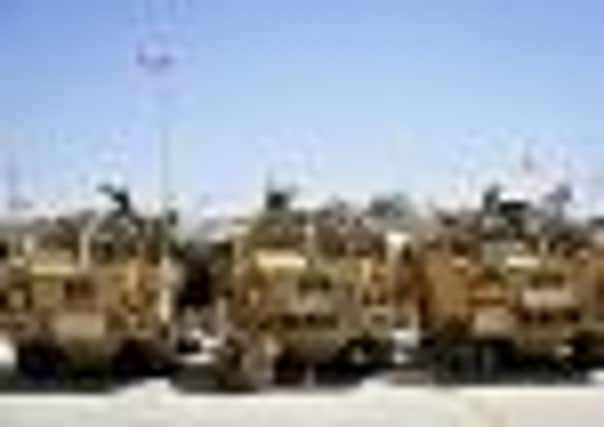Operation begins to remove Afghanistan equipment


When it comes to retreats from Afghanistan Britain’s historical record is rather patchy. In 1839, there was but a single solitary survivor from an entire division. Forty years later, after the Second Afghan War, British troops were saved from a similar debacle by a courageous general who rescued soldiers encircled in Kandahar.
This time, the Ministry of Defence is hopeful when all British combat operations cease by the end of 2014, their retreat will have been completed far more successfully. The massive operation to airlift thousands of tonnes of equipment from Afghanistan is under way.
Advertisement
Hide AdAdvertisement
Hide AdCamp Bastion, which over the past decade has grown to the size of a small town, four miles long and two miles wide, with enough accommodation for 28,000 people, is in the midst of the mother of all spring cleans.


At the moment, the MoD has £4 billion worth of kit, including 3,000 armoured vehicles, in the country, all of which – from nuts and bolts to helicopters –must be returned to the UK. The plan is to leave as little as possible behind in 2015, when
Afghan forces will take over complete control of their country. At Camp Bastion, there are now expanses of dust where canvas villages once stood.
From the 15-tonne Mastiff and 20-tonne Buffalo mine-protected trucks to far smaller trailers and buggies, battlefield vehicles sit parked in a 700-capacity compound. Used and out-of-date ammunition is collected ready to be sold for scrap.
Since January, some £70 million worth of British equipment has left Afghanistan and this is expected to increase rapidly as the withdrawal gathers pace.
Lieutenant Charles Ashington-Pickett explained that as well as ensuring nothing goes to waste, the process will prevent weapons and other potentially lethal equipment going astray.
He said: “We class this material as ACTO, meaning attractive to criminal and terrorist organisations. This ranges from weapons and ammunition to radios, cameras and batteries.”
His unit is responsible for taking stock of all kit that is returned as more advanced bases close or scale down. Bases that will for the time being continue to operate are encouraged to de-clutter, to ensure they are ready to pack up quickly when the time comes. Until the beginning of this year, roughly £500,000 worth of equipment each month moved through six huge canvas warehouses at Camp Bastion. They are now handling 60 times as much, about £30m a month.
Advertisement
Hide AdAdvertisement
Hide AdSome is reused in Afghanistan, but increasingly it is being flown back to the UK. Once home, it will be kept ready for future conflicts or sold to other countries. Major Katie Lamont’s unit is responsible for sorting and packing the loads. One of their roles is to handle spent ammunition and unusable live rounds. The high brass and steel content means the decommissioned rounds can be sold as scrap for £2,000 per tonne.
“By the end of this week, we will have transported 320 tonnes of ammunition back to the UK since January,” Maj Lamont said. “One aircraft can carry 80 tonnes, worth about £160,000. The cost of the flight is about £20,000, so it represents good value for money.”
Unwanted armoured vehicles will go through an advanced service, similar to an MOT, and a high-powered chemical wash to ensure no insects or contamination are brought back to the UK.
Staff Sergeant Paul Dunning, whose team of engineers is coming to the end of a six-month tour, expects to have serviced 370 vehicles ready to return by the time they leave this month.
The government is also looking at alternative land routes out of Afghanistan. Road maps for peace are now being replaced by actual road maps.
When the Canadians left in 2011, they travelled through Pakistan and later reported that a quarter of their equipment went missing. The MoD is expected to take vehicles in a convoy north, through Uzbekistan and Kazakhstan on a 4,000-mile road trip to the Baltic port of Riga, from where they will be shipped back to Britain.
Like a family preparing to relocate, the Royal Scots Borderers, Ist Battalion of the Royal Regiment of Scotland, who recently completed a six-month tour of duty, including training and mentoring Afghan troops, are currently in the process of returning to Scotland.